“Only once has Clements sat as an APJ on an Apple trial that ended with a final written decision upholding any claims, and not once has he upheld all challenged claims.”

Clements’ presence on PTAB panels involving Apple were arguably a lethal cocktail for patent owner respondents.
As was recently reported by IPWatchdog Founder Gene Quinn, it has come to light that information made public by the California State Bar shows that Matthew Robert Clements, formerly an administrative patent judge (APJ) at the Patent Trial and Appeal Board (PTAB) has been hired as an attorney by consumer tech giant Apple Inc. Prior to his work as a PTAB APJ, Clements was a patent attorney at Ropes & Gray and he represented Apple as counsel in patent infringement matters, where Apple was a defendant. While at the PTAB, Clements served on APJ panels in a few dozen cases brought by Apple, a situation that raises questions of ethics and that brought to light other matters, such as a lack of any code of judicial conduct for PTAB APJs despite their importance in adjudicating U.S. property rights which can be worth billions of dollars.
We’ve previously reported on statistics showing the outcome of PTAB trials petitioned by Apple where Clements served as an APJ, noting that the mixture of those ingredients resulted in nothing short of a lethal cocktail for patents and their owners. With Clements’ departure from the PTAB now upon us, we wanted to revisit his career statistics at the PTAB using Lex Machina’s data analytics tools to see how the new Apple hire ruled in cases involving his current employer.
PTAB Validity Trial Outcomes Involving Apple and APJ Clements
Of course, to do this analysis justice, we first need a baseline against which to compare Clements’ Apple trials. From the very beginning of the PTAB through April 20 of this year, the PTAB has been petitioned to scrutinize the validity of patent rights 10,091 times. 5,170 of those petitions have been instituted, and 1,751 of those petitions that have been instituted, or 33% of the total instituted, have ultimately resulted in all challenged claims being determined to be invalid. The situation grows more dire for patent owners when looking only at those petitions that have been instituted and reached a final decision. When looking at those 2,618* petitions, that 1,751 figure for all claims invalidated grows to 67%, or two-thirds, of all final decisions. Only 461 times, 18% of all final decisions, were all claims upheld.
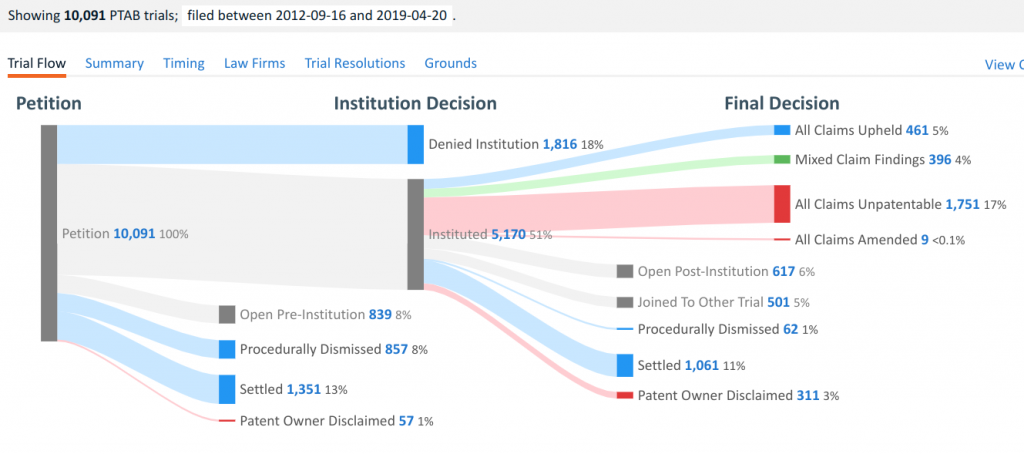
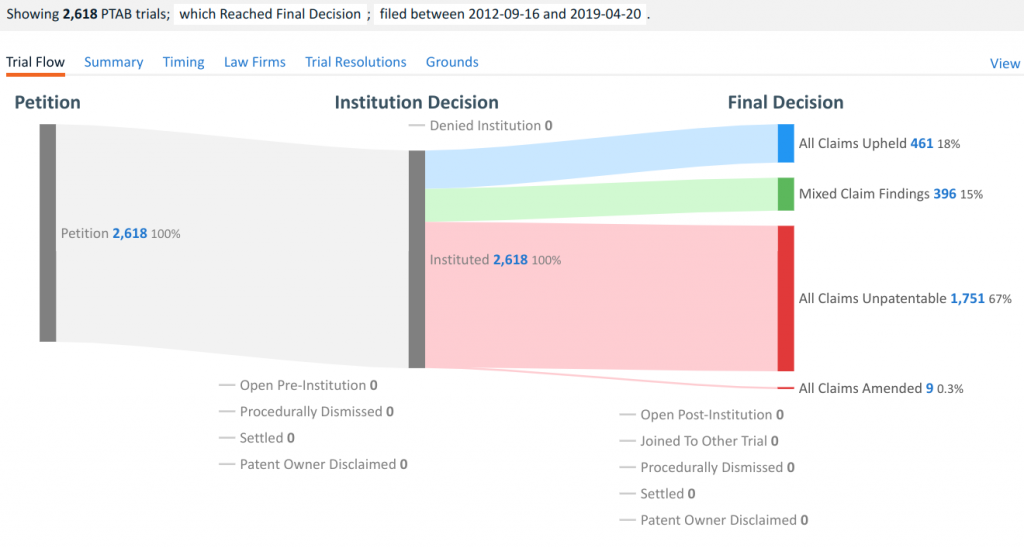
Already, we’re starting from a baseline that doesn’t appear at all friendly to patent owners. Once we start filtering the results to look at Clements’ work, however, the situation becomes even more bleak. There have been 366 petitions filed at the PTAB for validity trials where Clements has sat on the APJ panel at some point of the proceedings. 245 of those were instituted, and 153 of those reached final decisions. Of those 153, 107—or 70%–resulted in final written decisions where all claims were held invalid. Only 20 trials involving APJ Clements have led to all claims being upheld— only 13% of the final decisions involving Clements and only 5% of total petitions involving Clements.
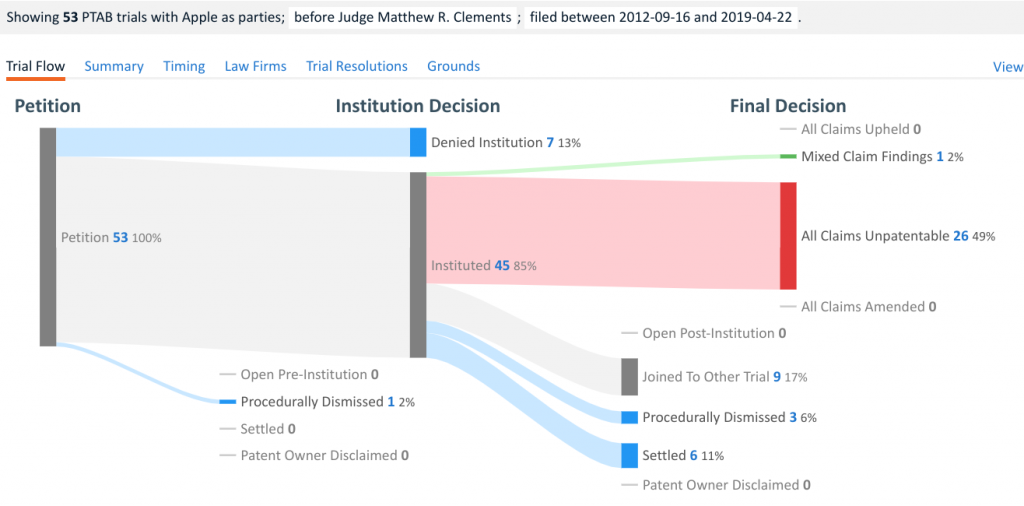
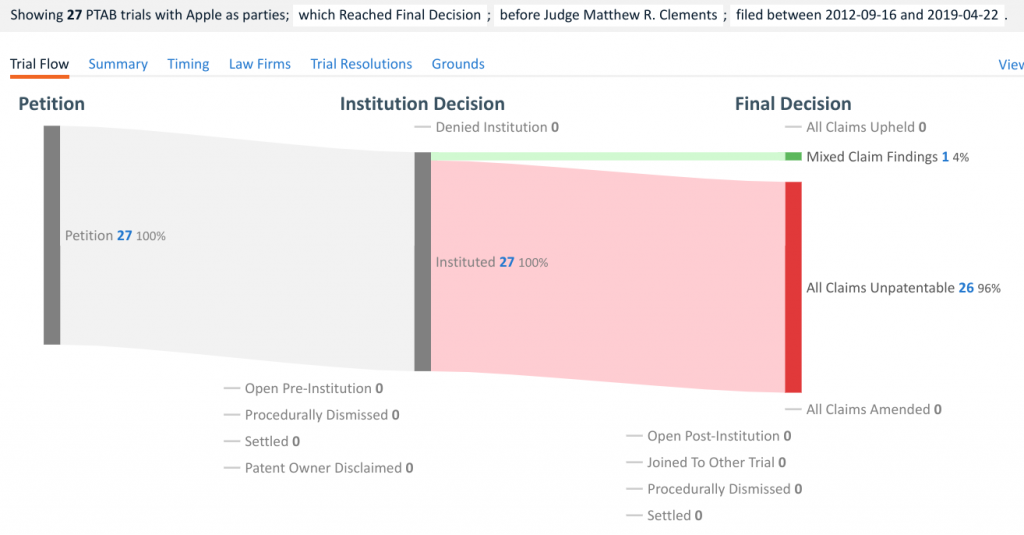
Apple has been one of the most prolific filers of petitions for validity trials at the PTAB, having filed 547 such petitions since the Board was enacted, more than 5% of all petitions filed at the PTAB. Apple on its own was already doing better than the average, as 115 of its petitions resulted in final decisions of all claims being held invalid. That’s 21% of all Apple petitions, and 79% of the 145 Apple petitions that have reached the final written decision phase.
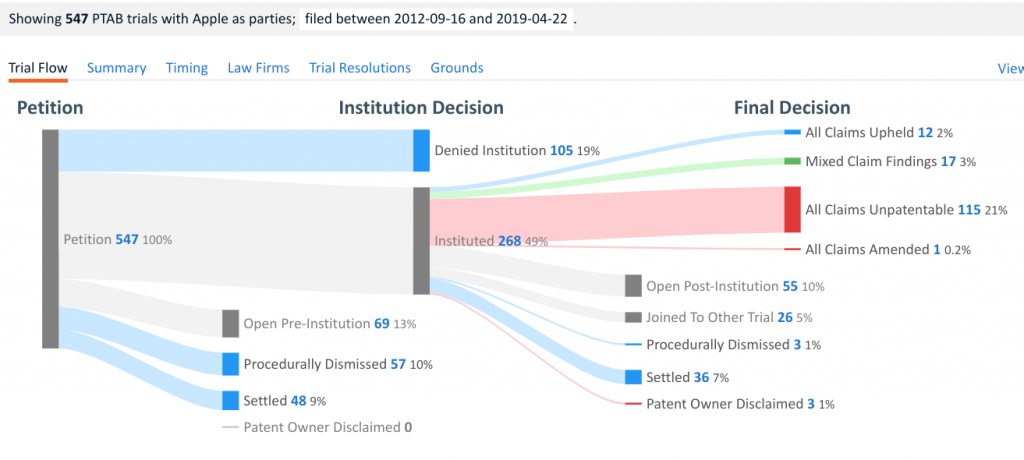
Stirring the “Lethal Cocktail”
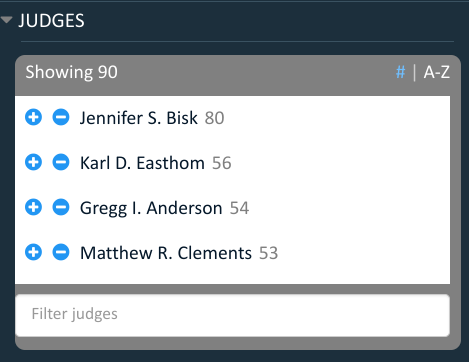
Mix these components together and the result is a kind of poison for patents that would put Socrates’ hemlock to shame. Clements has sat as an APJ on 53 PTAB petitions involving Apple as petitioner, making him the fourth-most active APJ on Apple’s PTAB docket. Of those 53 petitions, 26 of them have ended in final written decisions where all claims were held invalid. That’s 49% of all Apple petitions and 96% of those petitions that have reached final written decisions. Only once has Clements sat as an APJ on an Apple trial that ended with a final written decision upholding any claims, and not once has he upheld all challenged claims.
To be fair, while these figures may be updated since the first time we ran this story in June 2017, there hasn’t been a major change in either the total numbers or percentages when looking at the outcomes. Of course, perhaps the fact that there has only been one additional Apple petition added to Clements’ docket since our original story may itself be proof that bringing this situation to light had an actual impact on PTAB docketing practices, albeit in a limited sense. Still, there’s no doubt that patent owners such as Smartflash, Parthenon Unified Memory Architecture, e-Watch and others may wonder, with good reason, whether the PTAB deck was stacked against them from the very start.
A Look at the Ethical Concerns in an Article III Context
The situation involving Apple and former APJ Clements raises plenty of questions about optics and ethics, and while the PTAB is an Article I tribunal under the Executive Branch, Charles Gardner Geyh, the John F. Kimberling Professor of Law at Indiana University Bloomington Maurer School of Law, offered some perspective on how this situation would play out in an Article III context. He noted that Article III judges must recuse themselves from cases involving matters with which they were involved as counsel prior to ascending to the bench, as well as cases where one party is represented by counsel from the judge’s former firm and the matter was handled by the judge’s former firm while the judge was an attorney at the firm. “There is no problem with a judge presiding over a case involving his former client, as long as neither judge nor the judge’s former firm represented the client while the judge was still practicing at his former firm – unless the relationship between lawyer and former client remains so close that a reasonable person, fully informed of the circumstances, would call the judge’s impartiality into question,” Geyh said.
More information collected from Lex Machina shows that, were these PTAB trials to have been conducted in an Article III context, there may have indeed been the kind of ethical conflict requiring recusal that Geyh discusses. In at least two covered business method (CBM) reviews challenging Smartflash patents that were petitioned by Apple and involved Clements as an APJ, Apple was represented by a legal team from Ropes & Gray including James Batchelder. As we’ve previously reported, Clements worked at the East Palo Alto office of Ropes & Gray, where Batchelder served as managing partner, and Batchelder was counsel of record defending Apple in the patent infringement suit brought by Smartflash. While it’s unclear whether Ropes & Gray was involved in the Smartflash case while Clements worked in Batchelder’s office, this starts to look like the kind of situation where impartiality could be reasonably questioned.
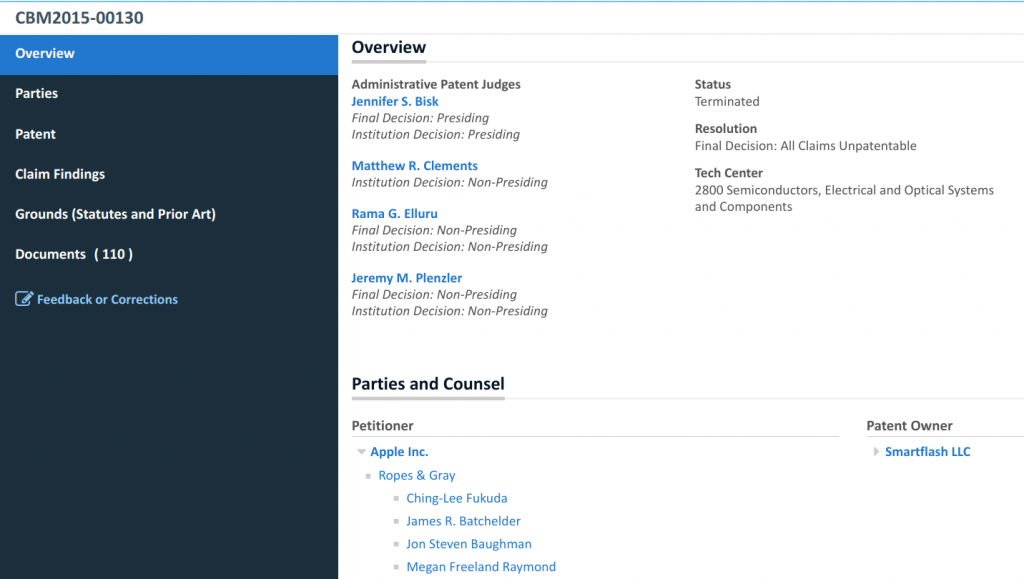
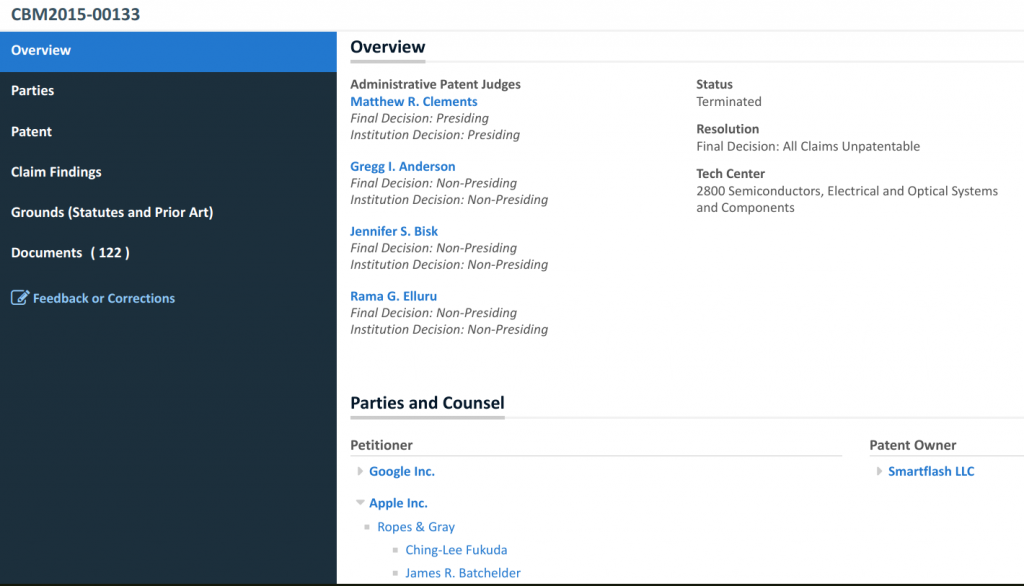
Further, Clements’ new work relationship as an Apple employee poses new ethical concerns. Geyh said that the business of a judge’s pursuit of an employment opportunity with parties appearing before the judge was more problematic and absolutely required recusal of an Article III judge even in the absence of the aforementioned situations of prior representation. “The reason is pretty obvious: a reasonable person, fully informed of the circumstances, would doubt the impartiality of a judge who presides over a case in which one of the lawyers or parties is in a position to influence the judge’s career,” Geyh said. “So, if the judge was presiding over cases where Apple was a party while he was negotiating future employment with Apple, there would be a problem.”
Article I Tribunals Often Subject to Political, Bureaucratic Pressure
Although the PTAB operates in an Article I context, James Pfander, the Owen L. Coon Professor of Law at Northwestern University Pritzker School of Law, indicated that case law precedent shows a strong preference for Article I tribunals to operate with proper oversight from Article III courts. Limits to the ability of Article I tribunals to adjudicate rights have previously come up in the bankruptcy court context in U.S. Supreme Court cases such as Stern v. Marshall (2011), a case that was oft-cited to SCOTUS in the lead-up to its decision in Oil States, as well as Northern Pipeline v. Marathon Pipe Line (1982). Further, while 1932’s Crowell v. Benson allowed for the adjudication of certain rights by administrative agencies, Article III courts still maintained final control over all issues of law and the factual record on which those issues could be resolved. “Not every case coming up to the Article III courts from an agency triggers full-bore Crowell-style review; it depends to some extent on the issue the litigants choose to raise,” Pfander said.
Of course, with life-tenured, independent and presumably unbiased judges, the quality of non-Article III tribunals like the PTAB can vary significantly from the federal judiciary, and this is where it could be argued that the situation with APJ Clements comes into play. “Some Executive Branch tribunals operate in an environment that subjects them to a good deal more political and bureaucratic pressure,” Pfander said. While it wasn’t obvious to him that a single instance of biased judging by an APJ at the PTAB would trigger any heightened degree of Article III scrutiny of the PTAB in general, given the fact that APJ decisions would be subject to internal agency review and then eventually review in an Article III court, it certainly could result in taking a harder look at any particular decision of a potentially biased APJ.
IPWatchdog note: Lex Machina’s calculation seems to be in error – the number should be 2,617 but is listed as 2,618.
Image Source: Deposit Photos
Photo by NikolayN
ID: 50874275

![[IPWatchdog Logo]](https://ipwatchdog.com/wp-content/themes/IPWatchdog%20-%202023/assets/images/temp/logo-small@2x.png)

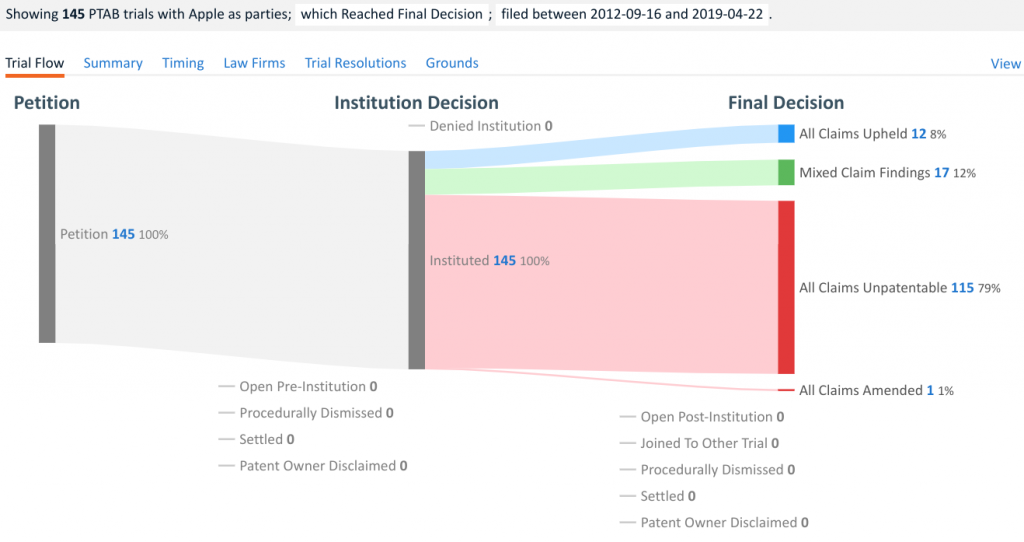
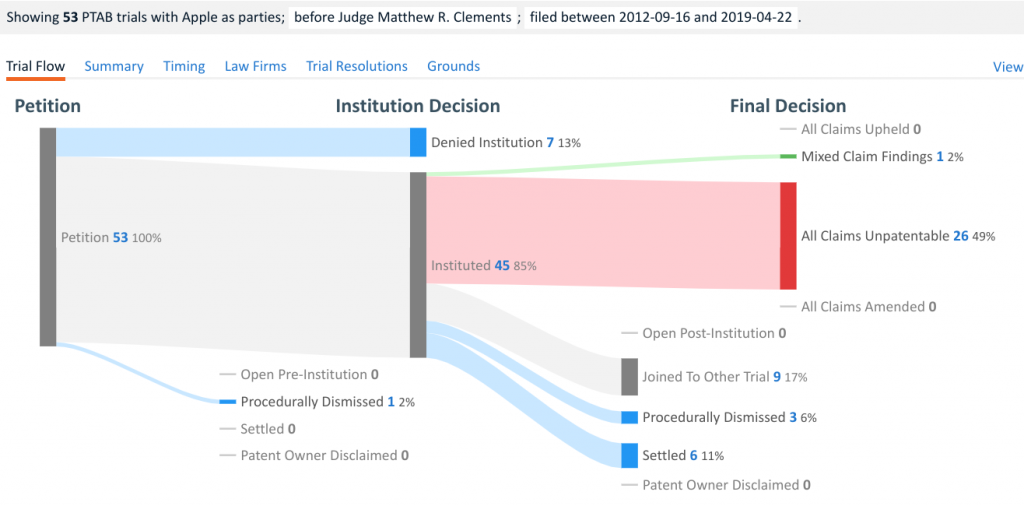
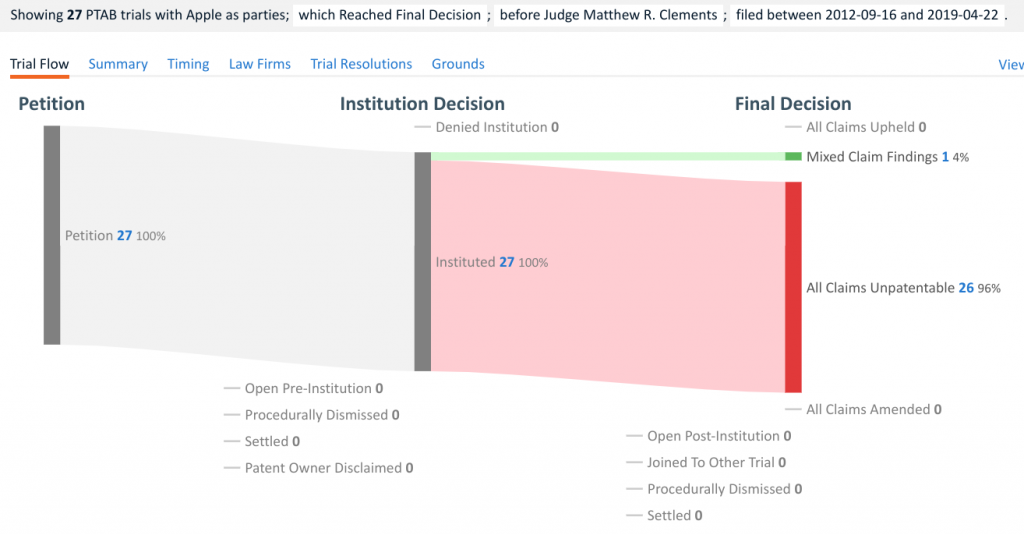
![[Advertisement]](https://ipwatchdog.com/wp-content/uploads/2024/04/Patent-Litigation-Masters-2024-sidebar-early-bird-ends-Apr-21-last-chance-700x500-1.jpg)

![[Advertisement]](https://ipwatchdog.com/wp-content/uploads/2021/12/WEBINAR-336-x-280-px.png)
![[Advertisement]](https://ipwatchdog.com/wp-content/uploads/2021/12/2021-Patent-Practice-on-Demand-recorded-Feb-2021-336-x-280.jpg)
![[Advertisement]](https://ipwatchdog.com/wp-content/uploads/2021/12/Ad-4-The-Invent-Patent-System™.png)







Join the Discussion
38 comments so far.
Curious
April 30, 2019 07:31 pmMy consistent argument has been “no evidence = no accusation (by ethical folks).”
If actual misconduct was the only issue. It is not. Appearances of impropriety need only look at the appearances (i.e., optics), and the appearances are not good.
Anon
April 30, 2019 06:08 pmI am convinced that TFCFM is Tr011ing this topic, and view his note of “caution” as a thin veneer over a purposeful attempt to denigrate anyone interested in the issue (as aptly explained by Curious).
As for “boomerangs,” I see an only too common tactic of Accuse Others coming from TFCFM and his clear vested interest in trying to dispel interest in the appearance of impropriety.
SVI
April 30, 2019 06:00 pm@TFCFM
“I merely abhor small minds making naked accusations of misconduct against professionals, absent anything more than suspicion and a whiff of an opportunity for misconduct. One can only hope that boomerangs aren’t the only things that act like boomerangs.”
Talk about boomerangs. You previously admitted that the PTAB processes and/or actions of the “professional” in question delivered bad optics. Well, the optics inform the decisions of investors, inventors and others in the spheres of technology, innovation, law, the venture community and corporate governance. There are a lot of boomerangs zinging about due to these types of optics, don’t you think?
“I’d be pleased to consider ANYTHING beyond empty accusation. I regret that I’ve embarrassed you by demonstrating that you have no such “anything.” That is, of course, the hazard of making baseless accusations.”
How about the fact that owning a patent is now more of a financial liability for a small startup or individual inventor than not patenting their invention?
“It seems to me odd that the parties actually having a dog in one of the PTAB fights involving the APJ don’t appear to have moved for disqualification (or were denied if they did).”
So, after spending millions of dollars to defend a patent, and losing, you want them to gear up for another fight? That dovetails with the definition of insanity.
“It seems at least equally odd that neither you nor any other commenter has suggested the mechanism by which a crooked APJ would convince one or both of his colleagues on a panel to cooperate with the nefarious plot you propose (to ‘throw’ cases for Apple).”
What an odd request. The purpose of a journalist is to report facts, which has been done here in showing the cozy relationship between a tech goliath and a judge. The purpose of the PTAB is to invalidate patents, relying on just such a judge. You yourself acknowledged bad optics.
“It’s ALMOST as if a bunch of commenters here have mouths and egos bigger than their intellects. (However, as with the situation at issue, I’d need to know more about the specifics before proposing that that is so.)”
Tell you what. Try thinking of an invention 10 years before it’s commercialized, getting the invention patented and then pitch the patented technology to VCs. Tell us what happens. That ought to put these optics into perspective for you.
TFCFM
April 30, 2019 05:42 pm>Your main argument (repeated many times over) is essentially: no evidence = no problem.
Close, but that is only your dishonest mischaracterization of my argument. My consistent argument has been “no evidence = no accusation (by ethical folks).”
A mere “appearance of impropriety” is not misconduct, but rather an invitation to look closer to see if misconduct occurred. Neither you nor anyone else commenting here has presented the slightest evidence (=/= mere suspicion) of misconduct.
Curious
April 30, 2019 05:26 pmNope. No dog in the fight — I merely abhor small minds making naked accusations of misconduct against professionals, absent anything more than suspicion and a whiff of an opportunity for misconduct.
Hmmm … you just stumbled onto this website and decided to make your big stand on this particular issue? I’ve been on the internet too long to believe that one.
Regardless, having a company as a client, then acting as a judge who makes decisions in favor of the company, and then going back to work inhouse for that company is more than just “a whiff of an opportunity for misconduct.” If you cannot see that, perhaps your ‘larger mind’ needs to consult with an ethics expert.
I’d be pleased to consider ANYTHING beyond empty accusation. I regret that I’ve embarrassed you by demonstrating that you have no such “anything.” That is, of course, the hazard of making baseless accusations.
Yet again … this is tiresome … you are focusing on actual evidence of misconduct rather than the appearance of impropriety. Sorry to burst your bubble, but I never accused the APJ of actual misconduct so I have nothing to be embarrassed about. In fact, I’ve deliberately avoided doing so because this is a serious matter and I don’t have personal knowledge of the situation to make an accusation of actual misconduct. However, I can judge appearances, and the appearances look bad — really bad. If there was misconduct, the appearances would look the same as what we see now. Thus, while I have presented no accusation of actual misconduct, I am PERFECTLY COMFORTABLE making an accusation that this APJ’s conduct (in conjunction with Apple’s conduct to hire this APJ) did rise to the level of an appearance of impropriety.
It seems to me odd that the parties actually having a dog in one of the PTAB fights involving the APJ don’t appear to have moved for disqualification (or were denied if they did).
What, you think investigating an APJ on a panel is something that most parties do? Even if they did, you think it would be easy to find out if a particular APJ worked for a particular company? Recusal is not always done upon request. Rather, self-recusal is something that an ethical judge does upon realization that his/her involvement in a proceeding would give rise to an appearance of impropriety.
It seems at least equally odd that neither you nor any other commenter has suggested the mechanism by which a crooked APJ would convince one or both of his colleagues on a panel to cooperate with the nefarious plot you propose (to ‘throw’ cases for Apple).
Oh please. How much do you know about the PTAB? I can tell you that dissenting opinions are discouraged. Gene did an article about that in June of 2018 (I won’t reproduce the link as it is easy enough to find), and this discouragement of dissent has gone on for a lot longer than that. As such, if you’ve got one APJ who is strongly planting his flag on a particular position, it is not unreasonable that the other APJs (who are otherwise ambivalent on the issues) would find themselves persuaded to this position.
Get 3 people together to decide any particular issue (1 of them having a very strong opinion and the other two having no predilection on the issue), and I’m quite confident that the ultimate decision on the issue will more than likely mirror the person having the strong opinion. People collaborating on a project generally look to avoid conflict, and if the other two people have no strong reasons to disagree (particularly in a work environment that favors opinions against patentability) then it is easy to see how a single APJ can influence the opinion.
Regardless, how a single APJ could have made this happen isn’t the point. The point is that the APJs actions has caused erosion in the public confidence in the integrity and impartiality of the PTAB, as evidenced by the comments to this and other articles from people who are not attorneys (based upon my familiarity with their prior posts). Perhaps the even bigger issue, which is one that Gene has addressed, is the USPTO’s apparent lack of a procedure for addressing these types of ethical issues.
This APJ should have simply recused himself from working on all Apple cases. That would have been the ETHICAL thing to do. As noted above in this article, this APJ only had a single Apple case added to his docket after the original article was published. Was this solely because of the article’s negativity publicity or did the PTAB actually institute some more rigorous screening procedures to avoid these type of ethical concerns? I fear it is the former rather than the latter.
Your main argument (repeated many times over) is essentially: no evidence = no problem. This see no evil, hear no evil, speak no evil attitude does not appear to be conducive to a good ethical practice. While you many have a much more permissive attitude as to what is ethical at the USPTO and PTAB than us, that does mean that we have “mouths and egos bigger than [our] intellects.”
TFCFM
April 30, 2019 12:08 pm@Curious
>Clearly, you’ve got a dog in this fight.
Nope. No dog in the fight — I merely abhor small minds making naked accusations of misconduct against professionals, absent anything more than suspicion and a whiff of an opportunity for misconduct. One can only hope that boomerangs aren’t the only things that act like boomerangs.
> I asked you to describe what kind of “evidence” you are looking for, but you have declined to do so.
I’d be pleased to consider ANYTHING beyond empty accusation. I regret that I’ve embarrassed you by demonstrating that you have no such “anything.” That is, of course, the hazard of making baseless accusations.
It seems to me odd that the parties actually having a dog in one of the PTAB fights involving the APJ don’t appear to have moved for disqualification (or were denied if they did).
It seems at least equally odd that neither you nor any other commenter has suggested the mechanism by which a crooked APJ would convince one or both of his colleagues on a panel to cooperate with the nefarious plot you propose (to ‘throw’ cases for Apple).
It’s ALMOST as if a bunch of commenters here have mouths and egos bigger than their intellects. (However, as with the situation at issue, I’d need to know more about the specifics before proposing that that is so.)
Anon
April 30, 2019 09:28 amThank you Curious.
We are in agreement (again).
Curious
April 30, 2019 09:23 amEvery judge/APJ who has ever previously worked “for” or “against” a party that appears before her faces the same situation.
There is something called recusal. This APJ should have taken advantage of it — its not like he’s the only APJ at the PTAB.
Some time ago, I ran across an APJ whose name I’ve never seen before (or since) for one of my small clients. As it turns out, he used to work for one of my big clients, which is why I never saw his name before because all my appeals were for this big client. As I noted elsewhere, when you file an ex parte appeal, you list the real party in interest. As stated in MPEP 1205, “[t]he identification of the real party in interest allows members of the Board to comply with ethics regulations associated with working in matters in which the member has a financial interest to avoid any potential conflict of interest.”
That no one in two discussion threads now had pointed to anything more substantive than suspicions and potential-nefarious-plots strongly suggests to me that it is inappropriate to accuse anyone here of misconduct, at least until and unless evidence suggesting misconduct is identified.
Still beating that “misconduct” drum I see. Also, I asked you to describe what kind of “evidence” you are looking for, but you have declined to do so. I suspect you have not because that type of evidence that would satisfy you would be unlikely to be found even in the case of actual misconduct (e.g., a written agreement). As such, you are setting a bar so high that no one will reach it.
If you can identify ANY such evidence, we’re all ears.
Sounds like something a crime boss would say to a prosecutor knowing that he’s “tied up” all of the loose ends. You do the APJ no favors by defending him with the statement, in essence, that “you’ve got no proof.” There are better ways to defend him that that.
Clearly, you’ve got a dog in this fight. Anon and I have been on this blog for years and years and years. We both recognize the regulars, the occasional posters, and those who post here for the very first time. You’ve invested far more time on this issue than would be expected for somebody whose moniker has newly appeared. While I had an opinion about this particular matter, I held off commenting for quite some time (bearing in mind that this APJ’s past relationship with Apple was reported on a couple of years ago) until very recently. I inserted myself into this discussion because your comments lack an appreciation as to how bad this situation looks to both an insider and outsiders. Your single-minded focus on pointing out that there is no evidence of misconduct misses the point regarding the appearance of impropriety associated with these circumstances. Your continued attempts to pivot the discussion away from the appearance of impropriety to the lack of evidence of misconduct raises questions of your partiality regarding this issue.
TFCFM
April 30, 2019 09:08 am@NW
>-the “bad optics” is the bad behavior. The entire chain of people in charge should never have let this happen.
That’s just silly:
1) You postulate that no judge should be permitted to work for a party that appeared before her — plainly overkill. There’s no reason (even if the judge, once upon a time, worked for that party previously) to expect that a judge cannot impartially decide a matter if the mere possibility exists that the judge might someday entertain employment by a party to the matter.
2) You merely *assume* that “[t]he entire chain of people in charge” either did nothing or failed to act properly. There appears to be no reason to believe that neither the APJ nor the wannabe-employer consulted with others (regardless of their not being any duty to do so). Neither does there appear any reason to believe that “[t]he entire chain of people in charge” did nothing and/or failed to act properly.
I cannot help but wonder whether anyone whining in this conversation would have the same wimpers if “Apple” were replaced by “law firm X Y & Z.” Should we implement a rule that no lawyer may ever act as a judge in any matter in which a former client of his firm appears on either side? Should any such post-law-firm judge be forbidden from resigning her judgeship and resuming work with her previous firm… just ‘cuz?
Night Writer
April 30, 2019 07:19 am@27 TFCFM I’ve “admitted” this since my initial message. My point all along has been to suggest that it’s inappropriate to accuse individuals or parties of misconduct based merely on “bad optics.”
You have no idea what you are talking about or you are just making things up as a smoke screen. The bad conduct is to allow the “bad optics.” That is the bad behavior. And, the circumstantial evidence is strong enough that the FBI should investigate APJ Matt Clements. Is there evidence of a quid pro quo? No. Is there evidence that there could be a quid pro quo? Yes.
And again—the “bad optics” is the bad behavior. The entire chain of people in charge should never have let this happen. The fact that they did means they have not adhered to ethical standards befitting judges.
Anon
April 29, 2019 09:03 pmWho is the “we” in “we’re all ears”…?
TFCFM
April 29, 2019 08:04 pm@Curious
>You’ve admitted there is smoke — that is enough to raise ethical concerns. Period.
I’ve “admitted” this since my initial message. My point all along has been to suggest that it’s inappropriate to accuse individuals or parties of misconduct based merely on “bad optics.”
Every judge/APJ who has ever previously worked “for” or “against” a party that appears before her faces the same situation. In this instance, “misconduct” only occurs if the judge/APJ acts impartially toward that party.
Likewise, no judge/APJ is, or should be, disqualified from later working “for” or “against” a party that once appeared before her. In that instance, “misconduct” only occurs if the judge/APJ acts impartially toward (presumably in favor of) that party on account of the hope/promise of future employment.
Recognizing that an APJ/judge and a party *had an opportunity* to commit misconduct is a far cry from being sufficient to appropriate accuse either of misconduct (my original objection) — regardless of how much one hates or suspects one or more of the individuals/parties involved.
That no one in two discussion threads now had pointed to anything more substantive than suspicions and potential-nefarious-plots strongly suggests to me that it is inappropriate to accuse anyone here of misconduct, at least until and unless evidence suggesting misconduct is identified.
If you can identify ANY such evidence, we’re all ears.
(Extra for experts: Typing “They could have secretly plotted misconduct” is not evidence of misconduct.”)
Curious
April 29, 2019 05:40 pmAbsent any suggestion, there’s no indication of wrong-doing.
Actual wrong-doing isn’t the only problem here.
There’s no reason to believe that the APJ would/could throw a decision in the hopes of landing a future job, no evidence that this occurred or was sought by the litigant.
What do you mean no reason to believe that he could throw a decision? APJs can easily throw a decision. There is so much subjectiveness to the decision-making process at the Board that anyone who has a modicum of experience with the Board knows it could easily be thrown. Just looking at the issues of claim construction and determining obviousness, an APJ could easily push the outcome of the proceedings one way or another.
if the APJ is postulated to have been “biased” in favor of the litigant, then that litigant would be shooting itself in the foot by hiring the APJ
Not if the agreement was that the APJ would get out after “x amount of years” and the company would hire the APJ. Remember, the company was a client of the APJ before the APJ became an APJ.
If there’s some evidence of “misconduct,” please tell me what it is, because I’m missing it.
You keep pounding on that drum as if it is the only thing that matters. It is not. Arguing that there is no proof of misconduct doesn’t address the concerns about the appearance of impropriety. As I mentioned before, finding actual evidence of a qui pro quo agreement is going to be extremely hard — just ask Mueller. Assuming, for sake of argument, that there was misconduct, I doubt either party would memorialize such an agreement. What kind of evidence are you looking for?
You’ve admitted there is smoke — that is enough to raise ethical concerns. Period.
Anon
April 29, 2019 05:11 pm“Simply put, I see not the slightest evidence of fire”
Wow, TFCFM, are you reading what Curious and I are telling you? You continue to want the case “proven” before you “care.”
The appearance of impropriety is simply a far lower mark.
TFCFM
April 29, 2019 03:53 pm>Actually people have. They have identified an APJ ruling for a company, and then a company hiring the APJ.
Precisely. The APJ was on individual panels involving a frequent party and made decisions (together with other panelists). No one has made so much as the slightest intimation that the APJ’s written opinion was incorrect (or alleged that the APJ somehow twisted other panelists’ arms to go along). Absent any suggestion, there’s no indication of wrong-doing.
Likewise, a frequent litigant before the PTAB hiring an APJ who no longer wants to be an APJ is hardly shocking — no more so than the fact that that APJ has technical knowledge in the litigant’s industry. There’s no reason to believe that the APJ would/could throw a decision in the hopes of landing a future job, no evidence that this occurred or was sought by the litigant. Furthermore, if the APJ is postulated to have been “biased” in favor of the litigant, then that litigant would be shooting itself in the foot by hiring the APJ (and no longer reaping the benefit of the alleged “bias”).
Simply put, I see not the slightest evidence of fire, even if the air looks a little smoky.
If there’s some evidence of “misconduct,” please tell me what it is, because I’m missing it.
Curious
April 29, 2019 02:57 pm“Looking more closely” is what I have invited us to do in my comments.
A need to look more closely is what leads us to the appearance of impropriety, the avoidance of which is part of the code of judicial ethics. I’m not saying that he did anything wrong (i.e., actual misconduct). To do so (properly) would require the kind of evidence that Mueller was looking for, and none of us have the resources he had.
Neither you nor anyone else has yet identified ANY action by any person or party that appears to amount to anything remotely-approaching “misconduct.”
Your focus on actual misconduct fails to appreciate that public confidence in the judicial system can be eroded by appearances alone.
We do not need an ethical code to address actual misconduct. That can be addressed by the criminal system. A code of ethics is there to guide attorneys/judges as to their conduct in a manner that promotes the confidence of the public in the legal system.
I am quite sure that there are judges who could honestly rule for a company in a $100M lawsuit and then the very next day take a lucrative job with that company knowing that their employment had nothing to do with the judgment, and the judgment had nothing to do with their employment. However, the optics would be terrible if that happened.
ANY action by any person or party that appears to amount to anything remotely-approaching “misconduct.”
Actually people have. They have identified an APJ ruling for a company, and then a company hiring the APJ. What people don’t know is whether there was an explicitly or unstated tie between these two actions. I would be shocked if there was. However, I have more faith in attorneys than the next person, and whether there was an appearance of impropriety is not based upon my faith but on the perceptions of the public as a whole.
TFCFM
April 29, 2019 10:52 am@Curious
>Regardless of who did what, the optics are terrible.
I agree (basically – I might quibble whether they are “bad” vs. “terrible,” but we’re generally in agreement.)
“Optics” and “misconduct” are two VERY different things.
The bad/terrible optics make it appropriate to look more closely to try to detect misconduct. “Looking more closely” is what I have invited us to do in my comments.
Neither you nor anyone else has yet identified ANY action by any person or party that appears to amount to anything remotely-approaching “misconduct.” (“Proof” isn’t even on the table until the question of “proof *of what*” can be asked.)
Anon
April 27, 2019 10:02 amExactly Curious.
You state well the situation, and the fact that TFCFM across two threads and all the comments therein still seems adamant about wanting a level of “proof” while disparaging the situation causes me pause as to his/her intentions.
Not only not seeing what you state so plainly, but the level of emotion forthcoming against those who do see it, leads me to think that “caution” is a thin veil for something else.
Curious
April 26, 2019 11:33 pmRegardless of who did what, the optics are terrible.
Attorney works for company;
Attorney goes to the USPTO as APJ;
Attorney, as APJ, rules favorably for company in many IPRs; and
Attorney subsequently leaves USPTO and gets hired by company.
While not real judges, APJs like to fashion themselves as judges. That being said, real judges have an ethical responsibility to avoid impropriety and the appearance of impropriety.
As simply as a human can put it: WHO is alleged to have done WHAT?
It is the appearance of impropriety that is the problem here — whether or not Apple, in actuality had undue influence over Clements is not necessarily the issue.
As stated in MPEP 1205 regarding ex parte appeals, “[t]he identification of the real party in interest allows members of the Board to comply with ethics regulations associated with working in matters in which the member has a financial interest to avoid any potential conflict of interest.”
It is reasonable that after a period of time, it would be proper to have an APJ decide cases in which a former client was a party. While there is still a hint of tainted smell about it, but one could reasonably argue that this is permissible. However, when the APJ returns to private practice and is hired by this very same company, that what was an slightly off-putting smell becomes very, very strong stench, and people ask “was there a little quid pro quo going on?” Once these questions start getting asked, then the threshold of an appearance of impropriety has been crossed. Actual impropriety is not required.
As a result of APJ Clements going to work for Apple, people are always going to wonder whether the decisions in favor of Apple, made by APJ Clements while at the PTAB, were unduly influenced by Apple. This is from Canon 2 of the Code of Conduct for United States Judges: “A judge … should act at all times in a manner that promotes public confidence in the integrity and impartiality of the judiciary.” Getting a job at Apple does not promote the public confidence in the integrity and impartiality of the judiciary. Given the circumstances, the mere hiring of Clements by Apple has caused people to question the integrity of the PTAB.
Anon
April 26, 2019 10:12 pmTFCFM,
The answer is even simpler: open your eyes and read the articles.
TFCFM
April 26, 2019 05:51 pm>“Identifying” just does not mean “proving.”
I’ve asked no one to “prove” anything — merely to identify what wrong-doing is alleged. “But it’s APPLE!!!!” isn’t wrong-doing.
As simply as a human can put it: WHO is alleged to have done WHAT?
Anon
April 26, 2019 05:44 pmYou apparently have not read my posts (and adding name calling of “babies” just does not help you).
Your “precisely not done” is precisely wrong because you aim for a too high standard. “Identifying” just does not mean “proving.”
Please read my posts.
TFCFM
April 26, 2019 04:55 pm@Anon
You write:
> it is NOT my point to be “identifying” the purported wrongs – that is ALREADY being done in these articles…
My sole point is that that is precisely what has NOT been done — not in the prior blog post, not in the current one, and not in the comments responding to either. I hear a bunch of crybabies whining about how they don’t like big technology companies (an entirely understandable sentiment), and then whining about perceived misbehavior — WITHOUT identifying any misbehavior.
Apple prevailed in a bunch of PTAB proceedings (hardly surprising given how much they spend on good legal counsel and how many goofy internet / cell phone patents exist and get asserted against them and others). An APJ was previously employed by Apple, was involved in some of those PTAB proceedings, and has now taken a job with Apple. Hardly the best optics, but not misbehavior (absent some showing to the contrary).
If you would like us to believe otherwise, provide us some comprehensible reason to conclude that misbehavior occurred. Waving your hands *and* stomping your feet is hardly convincing.
Anon
April 26, 2019 04:38 pmTFCFM,
I have no clue as to why you would indicate that the public availability of the PTAB decisions has anything whatsoever to do with OUR interactions.
There is “at odds” to be had with such a non-sequitur.
Further, I am doing NO such “just waving my hands” – as it is NOT my point to be “identifying” the purported wrongs – that is ALREADY being done in these articles – and to which, YOU have been overly dismissive.
Do you really think that attempts like this from you that are nothing more than kicking up dust will provide a better overall view of your messages here? (that is, a more positive one, as opposed to the notion of “better” being MORE clear that you are just trying to cloud the underlyng issues).
TFCFM
April 26, 2019 04:06 pm@Anon
I merely note that your assertions that I, or anyone else, am preventing “focus” upon the alleged wrong-doing seems to be at odds with the public availability of the PTAB decisions.
If something wrong was done, “focus” us all on the wrong-doing by identifying it — not just waving your hands.
Anon
April 26, 2019 02:59 pmTFCFM,
You misconstrue what I say if you think the issue that I have with you is that I do not like you NOT jumping to conclusions.
I suggest you read my posts again, this time with the view that THAT is not what I am saying.
As to your additional requests, you appear — again — to want to be able to focus a conversation ONLY IF a case can be proven. As I have pointed out, that is simply not the correct standard, and especially if one is talking about the “appearance of impropriety.” You seem to want some “iron-clad” “evidence” where that level is simply not required (and the lack thereof does NOT mean that anyone is “jumping to conclusions” or “gossiping”).
It is as if you are trying to misconstrue the issues here. THIS is part of why I am more apt than not to dismiss your expressed views (notwithstanding the note of caution).
Josh Malone
April 26, 2019 02:12 pmIt is not individual corruption, it is systemic corruption. Clements is not a judge. He is a lawyer trained and conditioned (brainwashed?) to kill patents. Like the other 270 PTAB patent butchers his skill is to play games with technical words, map them to prior art, then play games with legal words to reach a finding that “it would have been obviousness”. They know nothing about the technology of the inventions they are reviewing. They know very little of the law. They think they are really smart at playing tricky word games. It is a farce and a blight on our nation that such a rogue incompetent tribunal continues to exist. Third world dictatorships can do as well.
It is not about Clement’s loyalties to Apple or any conflict of interest. The conflict is with our bedrock principles of government and law. If you hire a butcher it doesn’t matter whether or not he was kind to kittens when he was a child.
This quest for objectivity and balance is a fool’s errand. If the USPTO insists on butchering patents it doesn’t matter who they hire to do the deed.
TFCFM
April 26, 2019 01:22 pm@Anon
>You seem to still want a far too demanding standard that would in truth serve to prevent focus in the first place…
???
I don’t understand why or how you construe the fact that I decline to jump to conclusions to “prevent focus.”
Assuming the blog post is accurate, there are only 27 final decisions in which Apple was a party and APJ Clements was on the panel — FOCUS AWAY!!!
Show (and explain) which of those 27 decisions was improperly made by APJ Clements. (For bonus points, explain how he got one or more panel members to go along with his allegedly nefarious scheme.) Failing that, provide ***SOME KIND*** of evidence of wrong-doing. “Apple prevailed in a lot of matters” is not “evidence.”
Anon
April 26, 2019 07:38 amTFCFM (and possibly jacek, although I am not sure that I grasp the point of your “atta-boy” post),
I have to say that I again have a mixed response to your post.
I do agree with notions of caution, and to the extent that you “like” this more numbered approach I cannot disagree, but your post goes beyond that and (again) paints a far too much “I must have the case proven” level.
The fact of the matter is that even though serious, and even though PROVING fraud does carry heightened procedural aspects, inviting scrutiny (including focus on the matter – which is NOT “gossip”) does not require the level that you seem to want to have.
Just as in the other thread, you seem to be in such a rush to NOT see that something IS amiss here. You parse the single case after focus was brought as if that somehow is a “point” for your view and seem to dismiss the hard numbers that clearly show disproportionate treatment.
This disparity diminishes my view of your position – even as I am inclined to your statements of caution.
You seem to still want a far too demanding standard that would in truth serve to prevent focus in the first place. Such goes well beyond an “innocent until proven guilty” mechanism and would (and does) turn a blind eye to the appearance of impropriety that is part of the issue.
jacek
April 25, 2019 02:45 pmTFCFM
BRAVO!!!
This is exactly the way to handle such things.
Liberty
April 25, 2019 02:17 pm@TFCFM
These guys are professional criminals. Apple and the judges know the game chances are the were the ones thats wrote the new rules for 101 or Ebay or Alice. No chance you will be able to take out the largest king pin. The game does not work that way. Apple rules the board and has paid Government to do as it says.
Night Writer
April 25, 2019 02:10 pm@2 TFCFM
What you wrote is not on point and doesn’t address the points in the article.
Your whole post is just an obvious attempt at diversion.
Moses
April 25, 2019 10:19 am@Hungwell
You maybe hungwell, but dont think for a split second that Apple will be brought down by Government. Apple owns $52.6 billion in US Treasurys and Apple has over $500 Billion in cash, in off shore and in bank in America. Everyone likes their Apple stock and do not want to see their investment drop. Apple owns the game, and they write the rules.
TFCFM
April 25, 2019 10:15 am@Anon
To the contrary, I commend the fact-based and rule-based approach. This is the way to address issues such as these — not through unsupported assertions of unethical behavior.
With that said, It doesn’t seem clear to me that the data _actually_ support any assessment that wrong-doing has occurred. The data appear to show:
– that APJ Clement has taken on only one Apple-related matters recently (presumably including the period when he would have been discussing potential re-employment with Apple);
– that Apple succeeds at knocking over a lot of patents in PTAB proceedings (this could, of course, be attributable to Apple wisely choosing patents for challenge and then challenging them skillfully), and that it does so both when APJ Clement is on the panel and when he is not; and
– (nothing at all about the merits of the various proceedings).
After reviewing these data, I’m left at the same place as the earlier, unsupported piece left me: It’s conceivable that there may have been wrong-doing, but there’s no evidence that wrong was actually done.
Bill Hungwell
April 25, 2019 09:25 amExcellent write up Steve Brachmann and Gene is a true Gladiator for the truth and equality to expose the facts how companies like Apple bought up the system and own all the judges. This is a great injustice and criminal act that needs to be criminally prosecuted. Apple and any judges or government officials that have acted in favor in keeping the elites in power and not acting on the best interest of the majority and the rule of law need to be brought to justice.
Black Knight
April 25, 2019 08:47 amApple and Google created the PTAB, it was their guys that lobbied to create the AIA Act. Look patents do not have a chance Sillicon Valley sucked out all the oxygen out of the room with their money in order to spearhead their patent theft agenda. No one can and will do anything about it because greed is greater then doing the right thing. People need to stop beating around the bush and call it like it is America is a plutocracy and the injustice that is happening to patent owners is just a small example how America is falling apart. When you cater to the rich and ignore the masses the kingdom will crumble.
Wolfsteen
April 24, 2019 11:16 pmApple and Google created the PTAB and the AIA Act, remember Google put in their very own patent attorney to run the USPTO and make sure they win all their cases by stacking the judges to vote in their favor. The patent game is over in America Sillicon Valley controll the government. When you invest more then the oils company and the NRA into lobbying government its funny how everything you want comes to fruition. China and Germany are the only place inventors can get true patent protection America is dead.
Anon
April 24, 2019 05:20 pmI suppose that statistics like these may not suffice for TFCFM or Just Some Patent Attorney Jamoke.